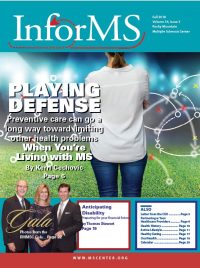Content contributed by Dr. Larry Coffee of Dental Lifeline Network. For more information, please visit: https://dentallifeline.org/beyond-teeth/
Dental cavities and gum diseases are bacterial infections that can make your MS symptoms worse. Bacterial infections, including cavities and gum disease, can spread more easily throughout our bodies when some disease modifying therapies quiet the immune system. Even a slight fever from infections, including dental, can increase flares.
Other drugs used for pain, fatigue, bladder and other spasms can make it easier for bacterial dental infections to develop and get worse by reducing the amount of saliva we produce, creating a dry mouth. Some drugs make it easier for dental infections to develop, while others make it easier for bacteria to spread and other complications.
How to Prevent Dental Infections
- Excellent oral hygiene. The bacteria can only do dental damage if they stay on the teeth. Daily oral hygiene may not seem important when you are experiencing other health issues, but it is necessary to prevent cavities, gum disease, and other complications too. Toothpaste and rinses with ‑uoride also help protect teeth.
- Eliminate “dry mouth.” Relieve dry mouth by sucking on sugarless candy, chewing sugarless gum, using an “artificial saliva” product.
- Regular dental exams. Cavities and gum infections may not be noticeable at rst, but dentists are able to identify them early and treat them before they become a problem. Regular dental exams are important, schedule them at times that are best for you, avoiding periods of flares or relapses. Sitting in a dental chair and keeping your mouth open may be dicult. Let your dentist know if you need to limit the length of your appointments.
Make Daily Oral Hygiene Easier and Effective
- Be thorough. Each tooth has five surfaces where bacteria collect and multiply. Brushing can remove the bacteria from three surfaces (cheek, biting, and tongue sides), but floss or a floss substitute such as Opal Pix is needed for the two side surfaces. Bacteria will begin to reattach to teeth quickly, so it is important to try to brush twice per day and floss once per day, if possible.
- Avoid fatigue. On difficult days when everything seems grueling and draining, you may understandably want to cut back on frequency of oral hygiene. It is important to continue being thorough, but make adjustments as needed. For example, clean the top teeth in the morning and the bottom teeth at night, but be thorough.
- Make Modifications. Consider a non-traditional toothbrush if grasping a standard brush is dicult. Electric toothbrushes have enlarged handles that can be easier to hold. Or your dentist can make the handle of a traditional toothbrush as large as you want by adding plastic or attaching the handle grip from a bicycle by filling it with plaster.
- Ask for help. If weakness, tremors, numbness or tingling of your hand hinder safe and effective oral hygiene, request help from a caregiver
- Use fluoridated toothpaste with antimicrobial ingredients and, if your dentist recommends it, a mouth rinse. Fluoride helps protect teeth from the harmful effects of bacteria. Look for products that have antimicrobial agents such as triclosan, or peroxide and baking soda to help kill bacteria. Antibacterial rinses may be useful, too.
- Denture Care. The area beneath full and partial dentures can become irritated and inflamed if the appliances are not removed, cleaned, and soaked overnight. If your hands feel weak or tremble, take special care in removing dentures so they don’t break if accidentally dropped. One option is to take them out over a sink filled with water. They will splash, but are less likely to break.
This information is a public service of the Dental Lifeline Network. This content is for educational purposes.






